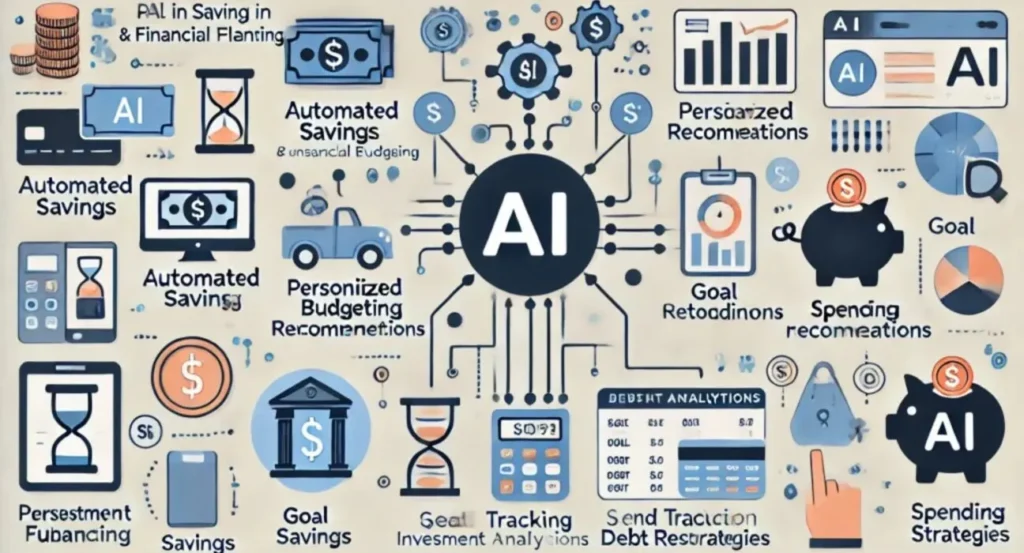Artificial Intelligence (AI) is no longer just a buzzword—it’s reshaping every part of our lives, from healthcare to transportation. But one of the most impactful areas where AI is making waves is personal finance.
In 2025, the way we save, spend, invest, and manage money is changing rapidly thanks to AI-driven tools. From personalized financial advice to fraud detection, AI has already revolutionized money management—and the future promises even bigger shifts.
This article explores how AI is transforming personal finance, the benefits and risks involved, and what individuals can expect in the years ahead.
The Rise of AI in Personal Finance
AI started as simple automation—like online banking alerts or auto-bill payments. Today, it’s evolved into intelligent systems that learn from your behavior, predict future needs, and help you make smarter financial decisions.
Banks, fintech startups, and even governments are adopting AI to improve services. Whether it’s an app that builds your budget or a robo-advisor that manages your investments, AI has become an invisible partner in money management.
1. AI-Powered Budgeting and Spending Insights
Traditional budgeting required spreadsheets and discipline. Now, AI-powered apps like Mint, YNAB, and Cleo analyze spending habits in real time and suggest practical ways to save.
- Automatically categorizes transactions (groceries, dining, bills)
- Identifies unnecessary subscriptions
- Predicts future spending based on past behavior
- Sends personalized alerts when you overspend
AI transforms budgeting from a chore into a seamless, automated process.
2. Robo-Advisors for Investment Management
One of the biggest revolutions in finance has been the rise of robo-advisors. These AI-driven platforms create and manage investment portfolios with little to no human involvement.
Benefits include:
- Low fees compared to traditional financial advisors
- Automated portfolio rebalancing
- Personalized strategies based on goals and risk tolerance
- Tax-loss harvesting for higher returns
For beginners, robo-advisors offer professional-grade investment management at a fraction of the cost.
3. AI in Credit Scoring and Lending
Traditional credit scoring often overlooks people with limited credit history. AI-driven systems analyze alternative data—like rent payments, utility bills, and online behavior—to create fairer credit assessments.
This benefits:
- Young adults or immigrants with thin credit files
- Small business owners seeking microloans
- Consumers in regions underserved by traditional banks
AI is making lending more inclusive and efficient, expanding access to credit worldwide.
4. Fraud Detection and Cybersecurity
Financial fraud is a growing threat in the digital world. AI has become a critical weapon against it.
How AI fights fraud:
- Analyzes millions of transactions in real time
- Flags unusual spending patterns instantly
- Uses machine learning to adapt to new fraud techniques
- Protects customers with biometric authentication (fingerprint, face ID)
Thanks to AI, financial institutions can detect fraud within seconds, saving billions annually.
5. Personalized Financial Planning
AI doesn’t just crunch numbers—it learns your habits and goals. Many apps now act as digital financial coaches, offering tailored advice like:
- How much to save for retirement
- Which debts to pay off first
- How to build an emergency fund
- When to refinance loans
Unlike generic advice, AI makes recommendations specific to your life and circumstances.
6. AI in Banking and Customer Service
Chatbots powered by AI are replacing traditional call centers. Instead of waiting on hold, customers can:
- Get account balances instantly
- Block stolen cards in real time
- Receive answers to FAQs 24/7
Banks are also using AI to predict when customers may need a new product—like a mortgage, insurance, or loan—making the process proactive instead of reactive.
7. AI and Financial Literacy
AI isn’t just about managing money—it’s also teaching people how to handle it better. Tools now:
- Provide gamified saving challenges
- Explain complex financial terms in simple language
- Help students learn money management early
This makes financial literacy more accessible, especially to younger generations.
8. Risks and Challenges of AI in Personal Finance
While AI brings major benefits, it also has challenges:
- Privacy Concerns – AI systems need huge amounts of personal financial data.
- Bias in Algorithms – Poorly trained AI could unfairly deny loans or services.
- Over-Reliance on Technology – Users may depend too much on apps and lose critical decision-making skills.
- Job Displacement – AI is reducing the need for human advisors and call center staff.
Understanding these risks helps individuals use AI wisely while protecting their financial freedom.
9. The Future of AI in Personal Finance
Looking ahead, experts predict:
- Hyper-personalized advice: AI financial planners that understand your lifestyle better than you do.
- Voice-activated banking: Managing accounts via smart assistants like Alexa or Google Assistant.
- AI-powered wealth growth: Predictive algorithms that spot investment opportunities in real time.
- Integration with wearables: Smartwatches and AR glasses guiding financial decisions on the go.
AI will make financial management more automatic, customized, and predictive than ever before.
Frequently Asked Questions (FAQs)
1. Is AI safe to use for managing money?
Yes. Reputable banks and apps use encryption and regulatory protections. Always choose trusted providers.
2. Will AI replace human financial advisors?
Not entirely. AI handles routine tasks, but complex financial planning may still require human expertise.
3. Can AI improve my credit score?
Indirectly, yes. AI-driven lenders consider alternative data, which may help those overlooked by traditional scoring.
4. Does AI make investing risk-free?
No. AI can optimize strategies, but all investments carry risks. Market conditions still play a big role.
5. Is AI available for free in finance?
Many budgeting apps and robo-advisors offer free or low-cost plans, making AI accessible to almost everyone.
Conclusion
AI is no longer just a supporting tool—it’s becoming the core driver of personal finance in 2025. From smarter budgeting to inclusive lending, it empowers individuals to save more, invest better, and stay protected against fraud.
However, AI should be viewed as a partner, not a replacement. By combining AI-driven tools with financial literacy and human judgment, people can create stronger, more secure financial futures.


